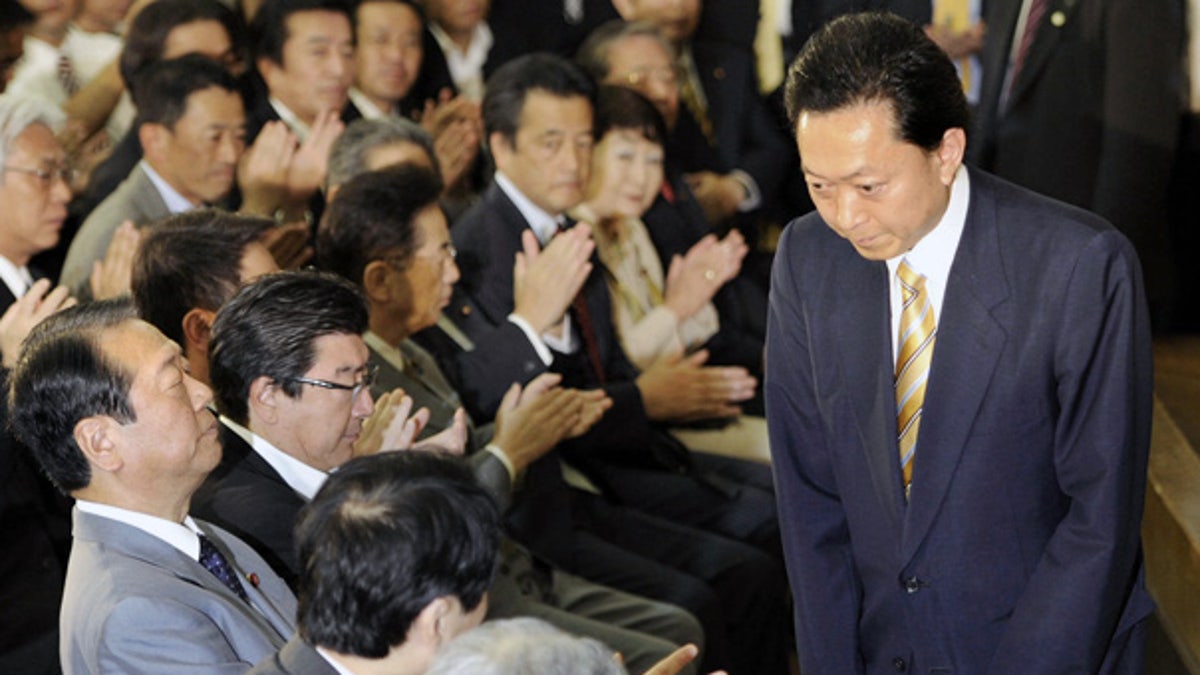
June 2: Japan's Prime Minister Yukio Hatoyama bows after announcing his resignation in Tokyo. (Kyodo, via AP)
TOKYO – Embattled Japanese Prime Minister Yukio Hatoyama said Wednesday he was resigning over his broken campaign promise to move a U.S. Marine base off the southern island of Okinawa.
The prime minister faced growing pressure from within his own party to resign ahead of July's upper house elections. His approval ratings had plummeted over his bungled handling of the relocation of the Marine Air Station Futenma, which reinforced his public image as an indecisive leader.
Hatoyama is the fourth Japanese prime minister to resign in four years.
Until Tuesday night, Hatoyama insisted he would stay on while intermittently holding talks with key members of his Democratic Party of Japan. But on Wednesday morning, after eight months in office, Hatoyama faced the nation to say he was stepping down.
"Since last year's elections, I tried to change politics in which the people of Japan would be the main characters," he told a news conference broadcast nationwide. But he conceded his efforts fell short.
"That's mainly because of my failings," he said.
Hatoyama, 63, cited two main reasons for his resignation: the Futenma issue, which led to the dismissal of one of his Cabinet members who could not accept his decision, and a political funding scandal. In that incident, two of his aides were convicted of falsifying political contribution reports and sentenced to suspended prison terms. Hatoyama himself did not face charges in the case, but it tainted his image.
His government came to power amid high hopes in September after his party soundly defeated the long-ruling conservatives in lower house elections.
Hatoyama had promised to forge a "more equal" relationship with the United States and to move Futenma off Okinawa, which hosts more than half the 47,000 U.S. troops in Japan under a security pact.
But last week, he said he would go along with the 2006 agreement to move the base to a northern part of the island, infuriating residents who want it off Okinawa entirely.
Hatoyama said Wednesday that recent tensions in the Korean peninsula surrounding the sinking of a South Korean warship reminded him of the potential instability in Northeast Asia and drove home the importance of the U.S.-Japan security pact.
"There was no choice but to keep the base on Okinawa," he said.
His three-way coalition was cut to two members over the weekend when a junior partner, the Social Democrats, withdrew after the prime minister expelled its leader Mizuho Fukushima, who rejected the Futenma decision, from the Cabinet.
"I need to take responsibility for forcing the Social Democrats to withdraw from the coalition," Hatoyama said.
Fukushima's dismissal enhanced her public standing as a politician who stood up for her convictions and reinforced perceptions of Hatoyama's wishy-washiness.
Hatoyama urged DPJ's powerful veteran and secretary general Ichiro Ozawa, who faces a separate political fundraising scandal, to step down as well, to achieve "a fresh and clean DPJ."
The Democratic Party of Japan and a remaining coalition partner still hold a majority in both houses of the Diet, or parliament -- though just barely in the less powerful upper house.
After his flip-flop on the base issue, some of his own party members began to see him as a liability in July's elections and urged him to step down.
Japan's largest newspaper, the Yomiuri, citing its own survey, said Tuesday nine out of 43 upper house lawmakers from Hatoyama's party seeking re-election in July said his resignation ahead of the poll was unavoidable, while 13 others urged him to make his own decision.
Hatoyama's party, voted in last year on promises to make politics more transparent and to rein in the power of the powerful bureaucrats, won public praise for its attempts to cut back on huge public works projects, a major plank of the previous Liberal Democratic Party, which ruled Japan for most of the previous 50 years.
But they were also criticized for being slow to implement other campaign promises, such as making expressways toll-free.
Hatoyama, the grandson of a prime minister who earned a Ph.D in engineering at Stanford University, was sometimes viewed as aloof and eccentric by the Japanese public, earning him the nickname "alien."
Such perceptions increased after investigators found that Hatoyama had received 15 million yen ($170,000) a month from his mother to support his political activities -- although he said had no knowledge of the contributions until the prosecutors' investigation.
Analysts have speculated that Finance Minister Naoto Kan might succeed Hatoyama. Kan gained prominence for exposing a 1996 government cover-up of HIV-tainted blood products that caused thousands of hemophilia patients to contract the virus that causes AIDS.
Public broadcaster NHK said the DPJ would elect Hatoyama's successor on Friday. Party officials did not immediately return phone calls.
